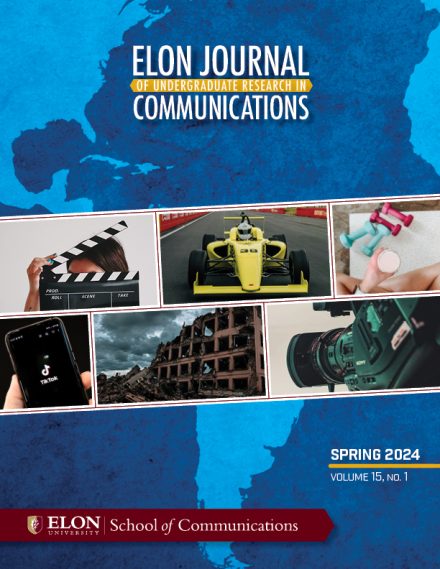In the most recent edition of the Elon Journal, six student researchers focused their efforts on two distinct forms of media – television and TikTok.
The School of Communications has published the spring 2024 issue of the Elon Journal of Undergraduate Research in Communications, featuring student research on far-ranging topics such as the use of social media propaganda distributed during the Russo-Ukrainian War to a content analysis of Duolingo’s brand communications success on TikTok.

“Student researchers in the Spring 2024 edition of the Elon Journal focused their efforts on two distinct forms of media – television and TikTok – and explored how each informs, persuades, and entertains an increasingly diverse audience,” said Professor Harlen Makemson, who serves as the journal’s editor.
The issue contains six research papers authored by School of Communications students, and kicks off with Alexandra Borda’s content analysis of the portrayal of women in telenovelas and American soap operas. The journalism major found that while traditional roles associated with women were found, the portrayal of women in telenovelas has drastically strayed away from the “stereotypical” Hispanic woman.
Meanwhile, media analytics major Heath Foster conducted a deep dive into Formula I auto racing, finding that outcome uncertainty impacts global Formula 1 viewership, but in a surprising manner. “Counterintuitively, as point differentials among teams increase, viewership rises, in the sample studied,” Makemson noted.
Keeping with a theme of television, Ellie Schmidt employed qualitative conversation analysis to examine excerpts of dialogue from the HBO hit “Succession,” concluding that profanity use strongly indicated a character’s intent to assert power, but it often had limited conversational effect. The cinema and television arts major found that profanity acted as an accessory to more successful power-related linguistic strategies, such as interruptions, topic control, and preferred responses.
Three student authors focused their respective research on the interplay between users and consumers on TikTok and similar social media platforms.
Journalism major Ava Girardi analyzed young female users’ comments to popular TikTok videos that use hashtags related to fitness, health, eating habits, and weight loss, identifying themes including body dissatisfaction, low self-esteem, disordered eating, and fixation on food and health. In keeping with the TikTok platform, strategic communications major Sadie Wiswall used content analysis to investigate Duolingo’s unique brand communication through the social media giant, which emphasizes entertainment over traditional promotion. Wiswall found that while Duolingo’s approach enhances brand visibility, questions persist about its conversion of social media engagement into tangible results.
While not strictly focused on TikTok, Miles Vance examined the video content and social media posts by Russian-, Ukrainian- and Wagner-affiliated channels during the Russo-Ukrainian War. The cinema and television arts and history double major found that the most common themes of their social media content were legitimization, deflection, humor, and violence. All three sides appear to use similar tactics, but “Russian channels often deign to engage in posting directly violent content,” Vance wrote.
“The articles in this edition demonstrate the strength of undergraduate research produced in the School of Communications, each study being the product of an earnest collaboration between student and faculty mentor,” Makemson wrote in his From the Editor section.
For the spring 2024 issue, Makemson assembled an editorial board of 29 communications faculty members who participated in the multiple blind-review process to select the best student work.
The Elon Journal began in spring 2010, with spring and fall editions each year. The spring 2024 journal marks its 29th edition. In recent years, the journal transitioned to become fully online, with each individual research paper available on its own respective webpage – increasing the content’s accessibility.
The Council on Undergraduate Research catalogs more than 200 student research journals in the nation, and the Elon Journal is one of the few that focuses on undergraduate student research in journalism, media and communications.


